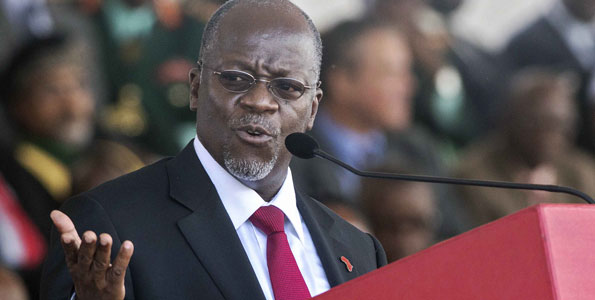Tanzanian President John Magufuli Sunday described the Economic Partnership Agreement (EPA) as a “form of colonialism”, dampening the country’s possibility of signing the deal with the European Union (EU).
“It is bad for our country,” Dr Magufuli affirmed.
Addressing a joint press conference with visiting Ugandan President Yoweri Museveni at the State House, Dr Magufuli disfavoured EPAs, which are aimed at creating a free trade area between EU and the African, Caribbean and Pacific Group of States.
His Ugandan counterpart warned African countries that EPA might break up their unity. “It’s better if the signing of the deal is shelved until further consultations are made.”
President Museveni arrived in Dar es Salaam Saturday morning for a two-day state visit.
Dr Magufuli noted that after studying EPA he had realised that African countries would not benefit from it economically as its architects touted.
He noted that terms included in the agreement were not intended to help African countries to grow economically.
“I believe that our neighbour, Uganda, will second us for the betterment of our countries. We have discussed EPA for a long time but to me it seems like another form of colonialism… it is bad for our country,” he said.
There has been criticism in other quarters that the non-reciprocal and discriminating preferential trade agreements offered by EU are incompatible with World Trade Organisation rules.
President Museveni noted that the fact that many African countries had not signed EPA shows that the proposal was meant to create disunity among African countries.
Negotiations ongoing
President Magufuli’s comments have come at a time when East African Community (EAC) countries are still negotiating the deal.
Late last year, Tanzanian lawmakers rejected EPA when the agreement was sent to Parliament for debate.
Mr Hussein Bashe (Nzega Urban-CCM) warned that EPA would kill EAC and that not all member states would enjoy the same benefits. “Some are going to earn a lot while others will see their productive sectors collapse.”
Mr Zitto Kabwe (Kigoma Urban-ACT Wazalendo) said: “We cannot allow the government to ratify the deal in its current form. It doesn’t mean that we have closed the chapter or we do not care about the welfare of EAC; all that we want is to make sure that our national interests are protected.”
Linking SGR
Meanwhile, Presidents Magufuli and Museveni also agreed on the immediate execution of the standard gauge railway (SGR) line to link the two countries to facilitate trade and interaction of people.
“The project is good for our economies and will enhance the ties that we have been enjoying for many years,” President Magufuli said.
He also said negotiations were underway for Air Tanzania to launch its flights to Entebbe.
The two leaders spoke about the construction of the Murongo-Kikagati power project to light up the Tanzania-Uganda border and stimulate economic activities. President Magufuli also welcomed Ugandan investors to Tanzania.
President Museveni commended cordial bilateral relations which have facilitated the undertaking of economic projects. “We are brothers and sisters. It’s good to see the pillars left by founders of our countries are protected for the betterment of our people.”
President Museveni said the construction of the SGR line and the transborder power project as well as Air Tanzania’s launch of the Dar es Salaam-Entebbe flights would improve people’s living standards.
He also suggested that inland container depots in Mwanza be improved to ease cargo transportation from Uganda to the Dar es Salaam Port.
War on corruption
President Museveni commended Tanzania for waging a war against corruption, saying it would increase government efficiency. He also invited President Magufuli to Uganda.
On the construction of crude oil pipeline from Hoima, Uganda, to the Tanga Port, Dr Magufuli said the two countries have ironed out all the hurdles that impeded the start of the construction of the 1,447-km pipeline.
Total has been contracted to carry out the project.
“On the part of Tanzania, there were seven issues, which we have already resolved. They include VAT exemption. The contractor can now start the work,” he said.
He noted that there was an added advantage to pass the pipeline through Sekenke in Tanzania as oil will be pumped by gravitational force to Tanga.
He hailed Uganda for picking Tanzania as a route for the pipeline because the country has experience in long distance pipelines.
“We have the Tazama pipeline which transports oil from Dar es Salaam to Zambia. We have also built a natural gas pipeline from Mtwara to Dar es Salaam. This will be the third pipeline in our country,” he said.
Source: The Citizen



